英文新加坡与意大利商务礼仪与谈判技巧
- 格式:ppt
- 大小:1.39 MB
- 文档页数:23
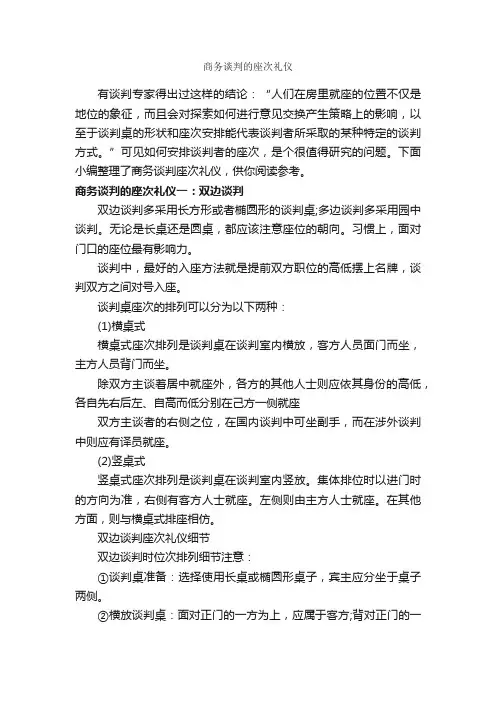
商务谈判的座次礼仪有谈判专家得出过这样的结论:“人们在房里就座的位置不仅是地位的象征,而且会对探索如何进行意见交换产生策略上的影响,以至于谈判桌的形状和座次安排能代表谈判者所采取的某种特定的谈判方式。
”可见如何安排谈判者的座次,是个很值得研究的问题。
下面小编整理了商务谈判座次礼仪,供你阅读参考。
商务谈判的座次礼仪一:双边谈判双边谈判多采用长方形或者椭圆形的谈判桌;多边谈判多采用园中谈判。
无论是长桌还是圆桌,都应该注意座位的朝向。
习惯上,面对门口的座位最有影响力。
谈判中,最好的入座方法就是提前双方职位的高低摆上名牌,谈判双方之间对号入座。
谈判桌座次的排列可以分为以下两种:(1)横桌式横桌式座次排列是谈判桌在谈判室内横放,客方人员面门而坐,主方人员背门而坐。
除双方主谈着居中就座外,各方的其他人士则应依其身份的高低,各自先右后左、自高而低分别在己方一侧就座双方主谈者的右侧之位,在国内谈判中可坐副手,而在涉外谈判中则应有译员就座。
(2)竖桌式竖桌式座次排列是谈判桌在谈判室内竖放。
集体排位时以进门时的方向为准,右侧有客方人士就座。
左侧则由主方人士就座。
在其他方面,则与横桌式排座相仿。
双边谈判座次礼仪细节双边谈判时位次排列细节注意:①谈判桌准备:选择使用长桌或椭圆形桌子,宾主应分坐于桌子两侧。
②横放谈判桌:面对正门的一方为上,应属于客方;背对正门的一方为下,应属于主方。
③竖放谈判桌:应以进门的方向为准,右侧为上,属于客方;左侧为下,属于主方。
④主谈判座次:各方的主谈人员应在自己一方居中而坐。
商务谈判的座次礼仪二:多边谈判多边谈判的由三方或三方以上人士所举办的谈判。
多边谈判的座次排列,主要也可分为两种形式。
(1)自由式自由式座次排列,即各方人士在谈判时自由就座,而毋须事先正式安排座次。
(2)主席式主席式座次排列,是指在谈判室内,面向正门设置一个主席位,由各方代表发言时使用,其他各方人士,则一律背对正门、面对主席之位分别就座。
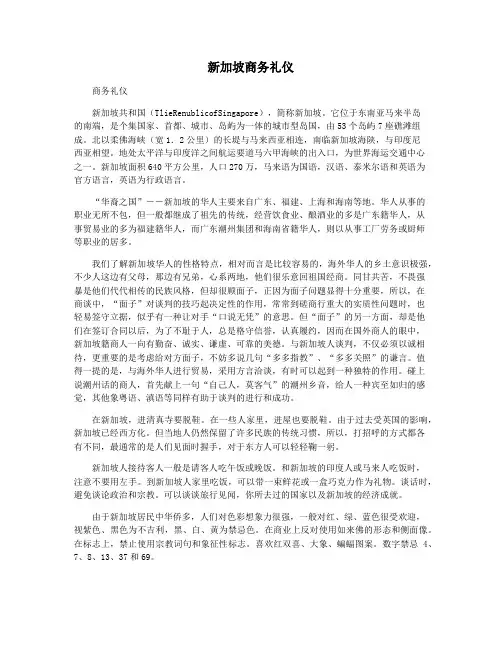
新加坡商务礼仪商务礼仪新加坡共和国(TlieRenublicofSingapore),简称新加坡。
它位于东南亚马来半岛的南端,是个集国家、首都、城市、岛屿为一体的城市型岛国,由53个岛屿7座礁滩组成。
北以柔佛海峡(宽1.2公里)的长堤与马来西亚相连,南临新加坡海陕,与印度尼西亚相望。
地处太平洋与印度洋之间航运要道马六甲海峡的出入口,为世界海运交通中心之一。
新加坡面积640平方公里,人口270万,马来语为国语,汉语、泰米尔语和英语为官方语言,英语为行政语言。
“华裔之国”――新加坡的华人主要来自广东、福建、上海和海南等地。
华人从事的职业无所不包,但一般都继成了祖先的传统,经营饮食业、酿酒业的多是广东籍华人,从事贸易业的多为福建籍华人,而广东潮州集团和海南省籍华人,则以从事工厂劳务或厨师等职业的居多。
我们了解新加坡华人的性格特点,相对而言是比较容易的,海外华人的乡土意识极强,不少人这边有父母,那边有兄弟,心系两地,他们很乐意回祖国经商。
同甘共苦,不畏强暴是他们代代相传的民族风格,但却很顾面子,正因为面子问题显得十分重要,所以,在商谈中,“面子”对谈判的技巧起决定性的作用,常常到磋商行重大的实质性问题时,也轻易签守立据,似乎有一种让对手“口说无凭”的意思。
但“面子”的另一方面,却是他们在签订合同以后,为了不耻于人,总是格守信誉,认真履约,因而在国外商人的眼中,新加坡籍商人一向有勤奋、诚实、谦虚、可靠的美德。
与新加坡人谈判,不仅必须以诚相待,更重要的是考虑给对方面子,不妨多说几句“多多指教”、“多多关照”的谦言。
值得一提的是,与海外华人进行贸易,采用方言洽谈,有时可以起到一种独特的作用。
碰上说潮州话的商人,首先献上一句“自己人,莫客气”的潮州乡音,给人一种宾至如归的感觉,其他象粤语、滇语等同样有助于谈判的进行和成功。
在新加坡,进清真寺要脱鞋。
在一些人家里,进屋也要脱鞋。
由于过去受英国的影响,新加坡已经西方化。
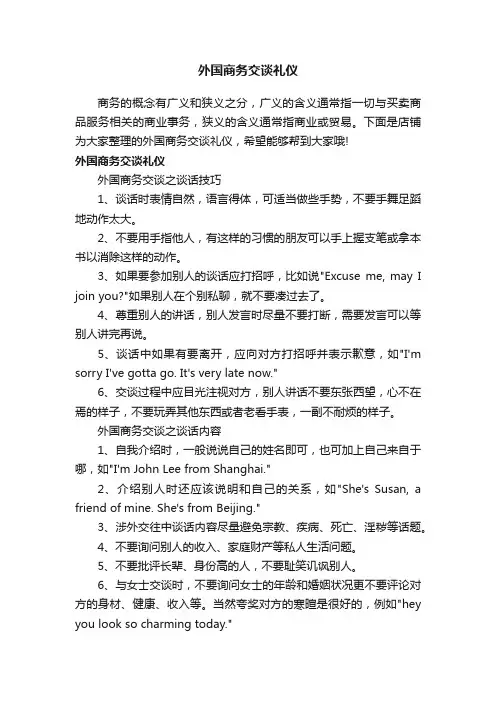
外国商务交谈礼仪商务的概念有广义和狭义之分,广义的含义通常指一切与买卖商品服务相关的商业事务,狭义的含义通常指商业或贸易。
下面是店铺为大家整理的外国商务交谈礼仪,希望能够帮到大家哦!外国商务交谈礼仪外国商务交谈之谈话技巧1、谈话时表情自然,语言得体,可适当做些手势,不要手舞足蹈地动作太大。
2、不要用手指他人,有这样的习惯的朋友可以手上握支笔或拿本书以消除这样的动作。
3、如果要参加别人的谈话应打招呼,比如说"Excuse me, may I join you?"如果别人在个别私聊,就不要凑过去了。
4、尊重别人的讲话,别人发言时尽量不要打断,需要发言可以等别人讲完再说。
5、谈话中如果有要离开,应向对方打招呼并表示歉意,如"I'm sorry I've gotta go. It's very late now."6、交谈过程中应目光注视对方,别人讲话不要东张西望,心不在焉的样子,不要玩弄其他东西或者老看手表,一副不耐烦的样子。
外国商务交谈之谈话内容1、自我介绍时,一般说说自己的姓名即可,也可加上自己来自于哪,如"I'm John Lee from Shanghai."2、介绍别人时还应该说明和自己的关系,如"She's Susan, a friend of mine. She's from Beijing."3、涉外交往中谈话内容尽量避免宗教、疾病、死亡、淫秽等话题。
4、不要询问别人的收入、家庭财产等私人生活问题。
5、不要批评长辈、身份高的人,不要耻笑讥讽别人。
6、与女士交谈时,不要询问女士的年龄和婚姻状况更不要评论对方的身材、健康、收入等。
当然夸奖对方的寒暄是很好的,例如"hey you look so charming today."外国商务交谈中的常用礼貌用语无论是涉外交往礼仪还是涉外商务礼仪都要求多用礼貌用语。
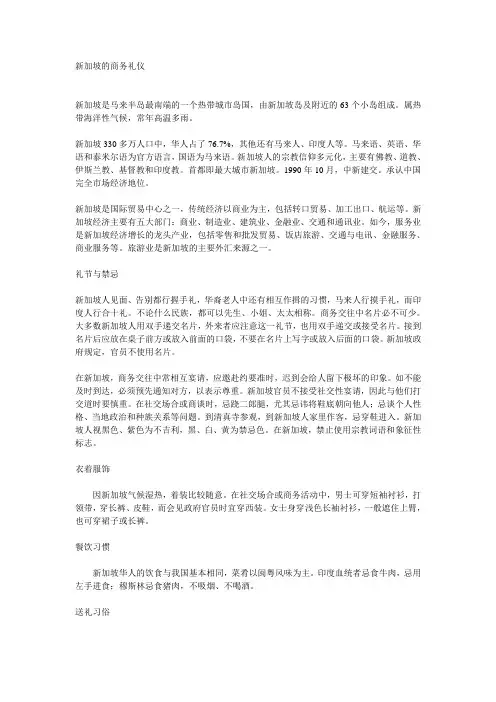
新加坡的商务礼仪新加坡是马来半岛最南端的一个热带城市岛国,由新加坡岛及附近的63个小岛组成。
属热带海洋性气候,常年高温多雨。
新加坡330多万人口中,华人占了76.7%,其他还有马来人、印度人等。
马来语、英语、华语和泰米尔语为官方语言,国语为马来语。
新加坡人的宗教信仰多元化,主要有佛教、道教、伊斯兰教、基督教和印度教。
首都即最大城市新加坡。
1990年10月,中新建交。
承认中国完全市场经济地位。
新加坡是国际贸易中心之一,传统经济以商业为主,包括转口贸易、加工出口、航运等。
新加坡经济主要有五大部门:商业、制造业、建筑业、金融业、交通和通讯业。
如今,服务业是新加坡经济增长的龙头产业,包括零售和批发贸易、饭店旅游、交通与电讯、金融服务、商业服务等。
旅游业是新加坡的主要外汇来源之一。
礼节与禁忌新加坡人见面、告别都行握手礼,华裔老人中还有相互作揖的习惯,马来人行摸手礼,而印度人行合十礼。
不论什么民族,都可以先生、小姐、太太相称。
商务交往中名片必不可少。
大多数新加坡人用双手递交名片,外来者应注意这一礼节,也用双手递交或接受名片。
接到名片后应放在桌子前方或放入前面的口袋,不要在名片上写字或放入后面的口袋。
新加坡政府规定,官员不使用名片。
在新加坡,商务交往中常相互宴请,应邀赴约要准时,迟到会给人留下极坏的印象。
如不能及时到达,必须预先通知对方,以表示尊重。
新加坡官员不接受社交性宴请,因此与他们打交道时要慎重。
在社交场合或商谈时,忌跷二郎腿,尤其忌讳将鞋底朝向他人;忌谈个人性格、当地政治和种族关系等问题。
到清真寺参观,到新加坡人家里作客,忌穿鞋进入。
新加坡人视黑色、紫色为不吉利,黑、白、黄为禁忌色。
在新加坡,禁止使用宗教词语和象征性标志。
衣着服饰因新加坡气候湿热,着装比较随意。
在社交场合或商务活动中,男士可穿短袖衬衫,打领带,穿长裤、皮鞋,而会见政府官员时宜穿西装。
女士身穿浅色长袖衬衫,一般遮住上臂,也可穿裙子或长裤。
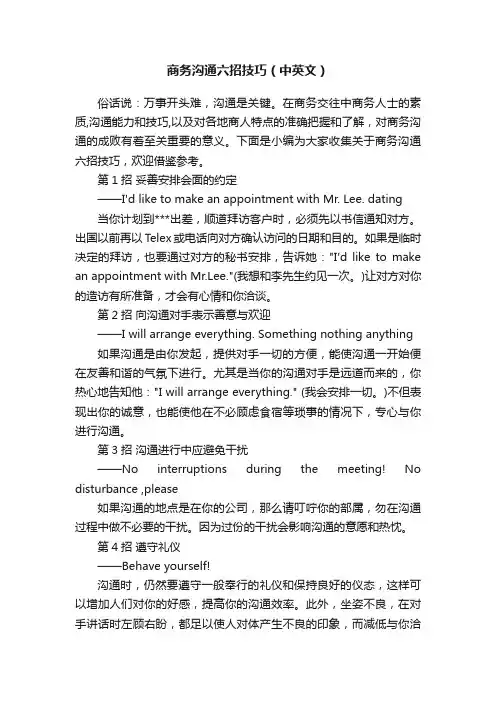
商务沟通六招技巧(中英文)俗话说:万事开头难,沟通是关键。
在商务交往中商务人士的素质,沟通能力和技巧,以及对各地商人特点的准确把握和了解,对商务沟通的成败有着至关重要的意义。
下面是小编为大家收集关于商务沟通六招技巧,欢迎借鉴参考。
第1招妥善安排会面的约定——I'd like to make an appointment with Mr. Lee. dating当你计划到***出差,顺道拜访客户时,必须先以书信通知对方。
出国以前再以Telex或电话向对方确认访问的日期和目的。
如果是临时决定的拜访,也要通过对方的秘书安排,告诉她:"I'd like to make an appointment with Mr.Lee."(我想和李先生约见一次。
)让对方对你的造访有所准备,才会有心情和你洽谈。
第2招向沟通对手表示善意与欢迎——I will arrange everything. Something nothing anything 如果沟通是由你发起,提供对手一切的方便,能使沟通一开始便在友善和谐的气氛下进行。
尤其是当你的沟通对手是远道而来的,你热心地告知他:"I will arrange everything." (我会安排一切。
)不但表现出你的诚意,也能使他在不必顾虑食宿等琐事的情况下,专心与你进行沟通。
第3招沟通进行中应避免干扰——No interruptions during the meeting! No disturbance ,please如果沟通的地点是在你的公司,那么请叮咛你的部属,勿在沟通过程中做不必要的干扰。
因为过份的干扰会影响沟通的意愿和热忱。
第4招遵守礼仪——Behave yourself!沟通时,仍然要遵守一般奉行的礼仪和保持良好的仪态,这样可以增加人们对你的好感,提高你的沟通效率。
此外,坐姿不良,在对手讲话时左顾右盼,都足以使人对体产生不良的印象,而减低与你洽谈的兴致。
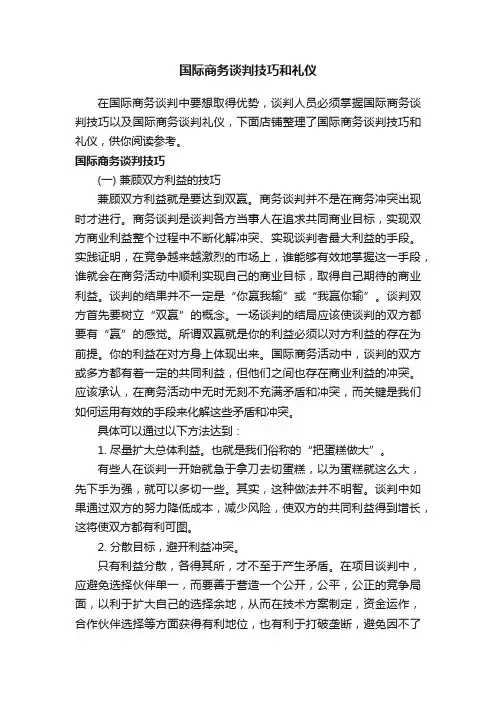
国际商务谈判技巧和礼仪在国际商务谈判中要想取得优势,谈判人员必须掌握国际商务谈判技巧以及国际商务谈判礼仪,下面店铺整理了国际商务谈判技巧和礼仪,供你阅读参考。
国际商务谈判技巧(一) 兼顾双方利益的技巧兼顾双方利益就是要达到双赢。
商务谈判并不是在商务冲突出现时才进行。
商务谈判是谈判各方当事人在追求共同商业目标,实现双方商业利益整个过程中不断化解冲突、实现谈判者最大利益的手段。
实践证明,在竞争越来越激烈的市场上,谁能够有效地掌握这一手段,谁就会在商务活动中顺利实现自己的商业目标,取得自己期待的商业利益。
谈判的结果并不一定是“你赢我输”或“我赢你输”。
谈判双方首先要树立“双赢”的概念。
一场谈判的结局应该使谈判的双方都要有“赢”的感觉。
所谓双赢就是你的利益必须以对方利益的存在为前提。
你的利益在对方身上体现出来。
国际商务活动中,谈判的双方或多方都有着一定的共同利益,但他们之间也存在商业利益的冲突。
应该承认,在商务活动中无时无刻不充满矛盾和冲突,而关键是我们如何运用有效的手段来化解这些矛盾和冲突。
具体可以通过以下方法达到:1. 尽量扩大总体利益。
也就是我们俗称的“把蛋糕做大”。
有些人在谈判一开始就急于拿刀去切蛋糕,以为蛋糕就这么大,先下手为强,就可以多切一些。
其实,这种做法并不明智。
谈判中如果通过双方的努力降低成本,减少风险,使双方的共同利益得到增长,这将使双方都有利可图。
2. 分散目标,避开利益冲突。
只有利益分散,各得其所,才不至于产生矛盾。
在项目谈判中,应避免选择伙伴单一,而要善于营造一个公开,公平,公正的竞争局面,以利于扩大自己的选择余地,从而在技术方案制定,资金运作,合作伙伴选择等方面获得有利地位,也有利于打破垄断,避免因不了解情况而陷入被动局面。
3. 消除对立。
在谈判中,双方经常由于对同一问题期望的差异而导致谈判进程受阻。
事实上,很多情况,双方只要认准最终目标,在具体问题上可以采取灵活的态度,问题就能迎刃而解。
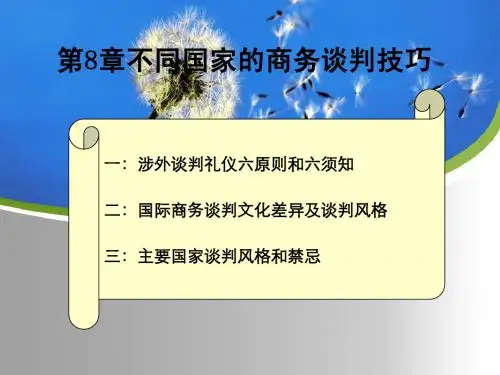
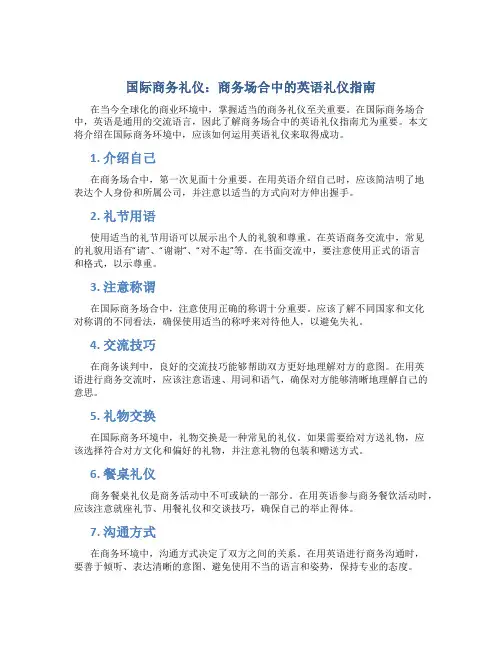
国际商务礼仪:商务场合中的英语礼仪指南在当今全球化的商业环境中,掌握适当的商务礼仪至关重要。
在国际商务场合中,英语是通用的交流语言,因此了解商务场合中的英语礼仪指南尤为重要。
本文将介绍在国际商务环境中,应该如何运用英语礼仪来取得成功。
1. 介绍自己在商务场合中,第一次见面十分重要。
在用英语介绍自己时,应该简洁明了地表达个人身份和所属公司,并注意以适当的方式向对方伸出握手。
2. 礼节用语使用适当的礼节用语可以展示出个人的礼貌和尊重。
在英语商务交流中,常见的礼貌用语有“请”、“谢谢”、“对不起”等。
在书面交流中,要注意使用正式的语言和格式,以示尊重。
3. 注意称谓在国际商务场合中,注意使用正确的称谓十分重要。
应该了解不同国家和文化对称谓的不同看法,确保使用适当的称呼来对待他人,以避免失礼。
4. 交流技巧在商务谈判中,良好的交流技巧能够帮助双方更好地理解对方的意图。
在用英语进行商务交流时,应该注意语速、用词和语气,确保对方能够清晰地理解自己的意思。
5. 礼物交换在国际商务环境中,礼物交换是一种常见的礼仪。
如果需要给对方送礼物,应该选择符合对方文化和偏好的礼物,并注意礼物的包装和赠送方式。
6. 餐桌礼仪商务餐桌礼仪是商务活动中不可或缺的一部分。
在用英语参与商务餐饮活动时,应该注意就座礼节、用餐礼仪和交谈技巧,确保自己的举止得体。
7. 沟通方式在商务环境中,沟通方式决定了双方之间的关系。
在用英语进行商务沟通时,要善于倾听、表达清晰的意图、避免使用不当的语言和姿势,保持专业的态度。
结论总的来说,掌握商务场合中的英语礼仪指南对于在国际商务中取得成功至关重要。
通过适当的自我介绍、礼貌用语、称谓、交流技巧、礼物交换、餐桌礼仪和沟通方式,我们可以在商务环境中展现出礼貌、尊重和专业素养,为自己赢得更多商业机会。
希望以上英语礼仪指南可以帮助您在国际商务场合中更加得体和自信地展现自己。
祝您在商务交流中取得成功!。
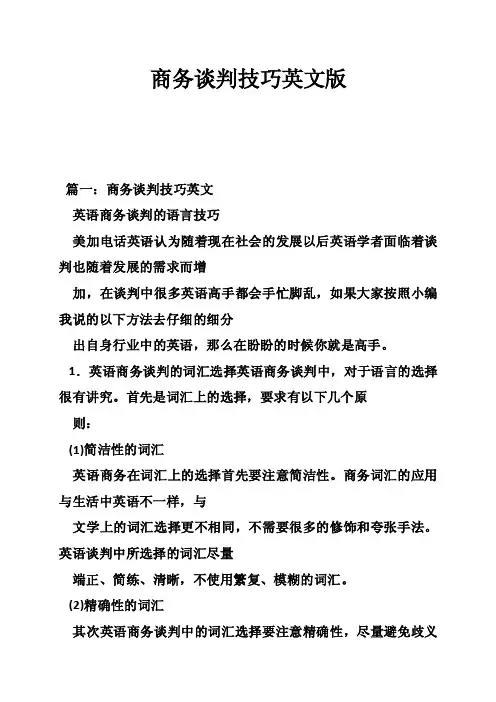
商务谈判技巧英文版篇一:商务谈判技巧英文英语商务谈判的语言技巧美加电话英语认为随着现在社会的发展以后英语学者面临着谈判也随着发展的需求而增加,在谈判中很多英语高手都会手忙脚乱,如果大家按照小编我说的以下方法去仔细的细分出自身行业中的英语,那么在盼盼的时候你就是高手。
1.英语商务谈判的词汇选择英语商务谈判中,对于语言的选择很有讲究。
首先是词汇上的选择,要求有以下几个原则:(1)简洁性的词汇英语商务在词汇上的选择首先要注意简洁性。
商务词汇的应用与生活中英语不一样,与文学上的词汇选择更不相同,不需要很多的修饰和夸张手法。
英语谈判中所选择的词汇尽量端正、简练、清晰,不使用繁复、模糊的词汇。
(2)精确性的词汇其次英语商务谈判中的词汇选择要注意精确性,尽量避免歧义的产生而导致对方的不满和不理解。
同时也不要为了表现谈判者的英语水平而使用英语方言、英语俚语、英语谚语、双关语、洋泾浜语等。
(3)少用表示情感的词汇在商务英语的谈判中,尽量少用修饰词或者带有感情色彩的词汇。
因为谈判语言的要求是实事求是,而感情色彩的词汇往往让人觉得虚假和不可信,甚至有吹嘘的嫌疑。
结果是令人反感。
相反,事实和陈述数据的利用往往能确切地反映出某种商品的特点,而且更具有说服力。
2.英语商务谈判的句型结构除了英语商务谈判的词汇选择之外,句子结构的选择也非常有讲究,而且有些句型结构是可选的,有些句型是一定不要选择或者尽量避免的。
(1)可选的句型结构1)条件句的应用条件句型在英语里按其意义可分为真实条件句(realconditiona1)和非真实条件句(ueal conditiona1)两大类。
真实条件句所表示的条件是事实或者在说话人看来有可能实现的事情。
商务谈判者在商务谈判中,通常要选择真实条件句来表达。
恰如其分地掌握和运用条件句,是谈判成功的重要因素之一。
此外,虚拟条件句的运用可以表示委婉语气。
通常情况下,表示请求、咨询、否定等口气时可以使用。
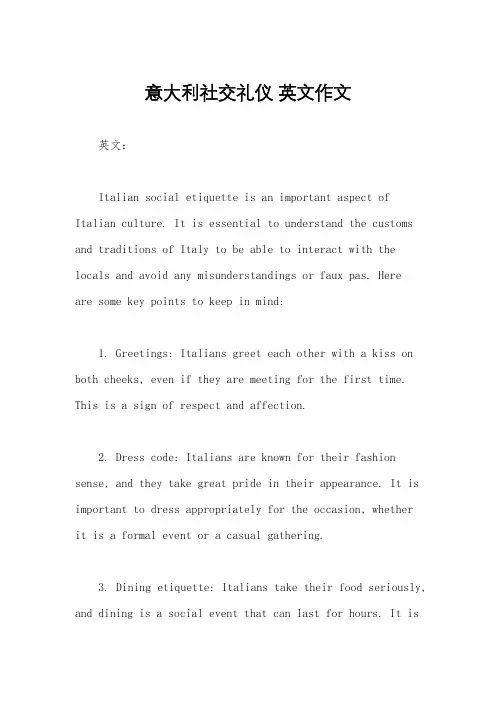
意大利社交礼仪英文作文英文:Italian social etiquette is an important aspect ofItalian culture. It is essential to understand the customs and traditions of Italy to be able to interact with the locals and avoid any misunderstandings or faux pas. Hereare some key points to keep in mind:1. Greetings: Italians greet each other with a kiss on both cheeks, even if they are meeting for the first time. This is a sign of respect and affection.2. Dress code: Italians are known for their fashion sense, and they take great pride in their appearance. It is important to dress appropriately for the occasion, whetherit is a formal event or a casual gathering.3. Dining etiquette: Italians take their food seriously, and dining is a social event that can last for hours. It isimportant to wait for the host to begin eating, and to never start before everyone else. It is also considered rude to ask for grated cheese or additional seasoning, asit implies that the food is not good enough.4. Gift giving: If you are invited to someone's home,it is customary to bring a small gift, such as a bottle of wine or a bouquet of flowers. It is also important to send a thank-you note after the event.5. Communication: Italians are passionate people and tend to speak loudly and with gestures. It is important to maintain eye contact and show interest in the conversation.中文:意大利社交礼仪是意大利文化的重要方面。
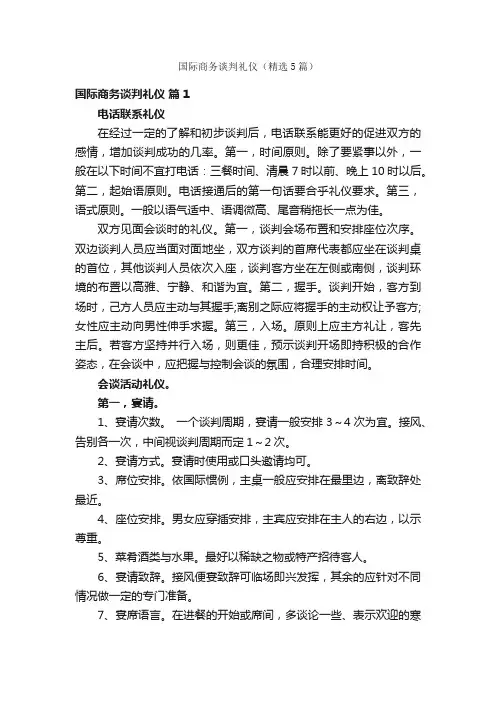
国际商务谈判礼仪(精选5篇)国际商务谈判礼仪篇1电话联系礼仪在经过一定的了解和初步谈判后,电话联系能更好的促进双方的感情,增加谈判成功的几率。
第一,时间原则。
除了要紧事以外,一般在以下时间不宜打电话:三餐时间、清晨7时以前、晚上10时以后。
第二,起始语原则。
电话接通后的第一句话要合乎礼仪要求。
第三,语式原则。
一般以语气适中、语调微高、尾音稍拖长一点为佳。
双方见面会谈时的礼仪。
第一,谈判会场布置和安排座位次序。
双边谈判人员应当面对面地坐,双方谈判的首席代表都应坐在谈判桌的首位,其他谈判人员依次入座,谈判客方坐在左侧或南侧,谈判环境的布置以高雅、宁静、和谐为宜。
第二,握手。
谈判开始,客方到场时,己方人员应主动与其握手;离别之际应将握手的主动权让予客方;女性应主动向男性伸手求握。
第三,入场。
原则上应主方礼让,客先主后。
若客方坚持并行入场,则更佳,预示谈判开场即持积极的合作姿态,在会谈中,应把握与控制会谈的氛围,合理安排时间。
会谈活动礼仪。
第一,宴请。
1、宴请次数。
一个谈判周期,宴请一般安排3~4次为宜。
接风、告别各一次,中间视谈判周期而定1~2次。
2、宴请方式。
宴请时使用或口头邀请均可。
3、席位安排。
依国际惯例,主桌一般应安排在最里边,离致辞处最近。
4、座位安排。
男女应穿插安排,主宾应安排在主人的右边,以示尊重。
5、菜肴酒类与水果。
最好以稀缺之物或特产招待客人。
6、宴请致辞。
接风便宴致辞可临场即兴发挥,其余的应针对不同情况做一定的专门准备。
7、宴席语言。
在进餐的开始或席间,多谈论一些、表示欢迎的寒暄语、本地的风土人情及一般情况,以此增进彼此的了解和友谊。
8、赴宴的礼节如下:入座:按主方给定的座位就座。
吸烟:饭后喝茶或咖啡的时候吸烟。
祝酒:应从主桌开始。
就餐:主方开始动菜时再进行。
离席:在绝大多数人用餐完毕后才离开。
如果有急事,要告知主人或周边的人,并向同桌人表示歉意。
第二,参观游览、观看文艺演出、联谊娱乐活动等。
商务谈判的技巧英文1. Preparation: Before entering into a business negotiation, it is crucial to thoroughly prepare by researching the other party's interests, goals, and potential negotiation strategies.2. Active listening: Listening attentively to the other party's perspective and opinions allows you to understand their position better and tailor your arguments accordingly. This shows respect and helps build rapport.3. Effective communication: Clearly articulating your own interests, goals, and proposals in a concise and persuasive manner is essential to getting your message across and maintaining control of the negotiation process.4. Problem-solving orientation: Adopting a problem-solving mindset helps to find mutually beneficial solutions and reach a consensus. Focusing on common interests rather than solely individual gains promotes cooperative negotiation.5. Flexibility and creativity: Being open to alternative solutions and approaches can lead to new possibilities and win-win outcomes. A willingness to compromise on non-critical issues can also foster goodwill and build trust.6. Time management: Maintaining control over the negotiation time frame prevents unnecessary delays and keeps the process focused. Establishing clear time boundaries for each agenda item helps manage the negotiation effectively.7. Building relationships: Investing time in building a positive relationship with the other party can enhance trust and facilitate smoother negotiations. Demonstrating empathy, respect, and professionalism can contribute to long-term successful business partnerships.8. Knowing your limits: Identifying your non-negotiable positions and boundaries is essential to avoid making concessions that may harm your interests or goals. Understanding your BATNA (Best Alternative To a Negotiated Agreement) helps determine your limits during the negotiation.9. Emotional intelligence: Being aware of your emotions and managing them effectively during the negotiation can prevent impulsive decision-making and maintain a calm and professional demeanor.10. Continuous learning and improvement: Reflecting on pastnegotiations and seeking feedback helps refine your negotiation skills over time. Being open to learning from both successes and failures contributes to ongoing growth as a negotiator.。
意大利商务礼仪及忌讳礼节礼仪意大利人在与宾客相见时,习惯热情向客人问好,面带笑容地以“您”字来称呼客人。
一般都喜欢客人用头衔称呼他们。
他们时间观念不强,对约会总习惯迟到,认为这样是礼节风度。
他们在官方场合衣着整齐、举止端庄,平时也极爱打扮自己。
在服饰上都喜欢标新立异。
他们有说话心直口快,情绪爱激动的特点,谈问题时从不转弯抹角或耍心计,一般都是直出直入的开诚布公。
意大利人习惯用手语表达个人的意愿,常用的手势有:用大拇指和食指圈成O形,其余三指竖起,意表“好”、“行”或“一切顺利”;竖起食指来回摆动,意表“不”、“不是”、“不行”;一边伸出手掌,再加上撇撇嘴,意表“不清楚”和“无可奉告”;用食指顶住脸颊来回转动,意表“好吃”;五批并扰,手心向下,在胃部来回转动,意表“饥饿”;五指并拢,用食指侧面碰击额头,意表骂别人“笨蛋”、“傻瓜”。
意大利人喜爱绿、蓝、黄三色,视绿色为春天的色彩;认为兰色会给人带来吉祥;黄色一般常用于美神及婚礼服装上。
他们偏爱邹菊,认为邹菊象征着意大利人民的君子风度和天真烂漫。
他们对狗和猫两种动物异常喜爱。
有的人把狗视为自己的家庭成员,认为狗是人类最忠实的朋友。
对猫感情极深的原因是,猫曾为当地消除鼠疫立下过功劳。
意大利人相互见面时,大多都惯行握手礼,常见朋友之间,多招手示意。
意大利的格瑟兹诺人,遇见朋友总习惯把帽拉低,以此表示对朋友尊敬。
一般礼仪按惯例,要给收拾房间的女佣、勤杂工以及停车场服务员等小费;即使帐单里已包含了服务费,仍应给侍应生留下少许小费。
称谓与问候意大利人全部喜欢握手和打手势来表达意思。
凡是大学毕业生都有头衔,而且希望你称呼他们时使用头衔。
约会与准时遵守时刻不是意大利人的德行――至少在社交活动时是不遵守的。
商业上的约会要事先安排好。
款待与馈赠午饭是一天中最丰盛的一顿,在特殊情况下可能持续两三个小时。
主人一再邀请吃中饭或晚饭而拒不接受,这被认为是不合乎礼貌的。
如果是在家里请客吃饭,你应该带去葡萄酒、鲜花或巧克力。
Global Business Protocol and Etiquette商务谈判的礼仪It is true that to err is human, but isn’t the aim supposed to be for zero defects these days? Maybe a reasonable goal would be to commit fewer blunders than any of the competitors. To help international business negotiating travelers avoid damaging blunders, and to achieve that goal, one has to know a good deal about international business protocol.Dress code着装的礼仪Climate and culture both play a role in sartorial behavior. In the tropics and hot desert climes, businessmen often wear an open-necked shirt and cotton trousers. But even in those markets it may be safer to wear a suit coat or blazer to the first meeting just in case. For meetings with government officials, this formality takes on greater importance.In most parts of the world, business women can choose between a good dress, suit or blazer and skirt. For men, a dark suit, conservative tie and dark socks will cover most meetings with high-status individuals. Here are a few culture-specific hints.①Visits to Latin Europe and Latin America require special attention to the style and quality of both men’s and women’s apparel and accessories.②In the Middle East, the business contacts often judge one partly on the quality and price of one’s briefcase, watch, pen and jewelry. One should wear and carry the best one has.③Germans feel more comfortable doing business with men whose shoes are brightly polished.④Throughout Asia, it is a good idea to wear slip-on shoes such as high quality loafers because custom requires removing footwear when entering temples, peoples′ homes and some offices as well.⑤Americans pay special attention to the condition of one’s teeth, so some Europeans include a visit to their dentist for a cleaning as part of their preparation.⑥In Muslim countries, female visitors should dress so as to show as little bare skin as possible. Americans vary somewhat according to location and type of business; visitors are well advised to wear a suit and tie to the first meeting with a new contact.In China, suit, white shirt, conservative tie for men and a conservative suit or dress for women.In India, men wear a dark suit when meeting government officials. For most private sector meetings, they wear a suit in the cooler months, shirt and tie or bush shirt (worn outside the trousers) without a tie in the summer. Women wear a conservative dress or blouse and skirt (below-the-knee length) and avoid revealing garb such as thin T-shirts, sleeveless blouses and tank tops.Kissing: hand, cheek, lips...or none of them亲吻的礼仪Non-European visitors tend to be perplexed by the variety of kissing rituals in the multicultural mosaic that is Europe. Here are some guidelines.①Don’t worry about kissing or being kissed for the first meeting.②At subsequent meetings foreigners are excused from all that promiscuous kissing if they do not wish to participate. This will be a relief to many Asians who feel ill at ease with the strange andembarrassing custom of kissing people one barely knows.③For men who do decide to join in, when kissing a woman’s hand or cheek don’t actually touch the skin. Just kiss the air a few millimeters from her hand or cheek.④Cheek-kissing: The proper Brits usually kiss just one (on the right cheek), the French twice (left, right) and the passionate Belgians three times: left, right, left.⑤Hand-kissing: The reticent Germans seem to do very little cheek-kissing. Like the Italians and Spanish, a German is more likely to kiss the hand.⑥For non-European women: When a man raises the hand to his lips, the appropriate response is to react as though this is about the fifth time it has happened that day, just acknowledge that gesture with a slight smile.⑦Some male visitors to Russia are not quite comfortable with being kissed on the lips by Russian men while enfolded in a great bear hug.Forms of address称谓的礼仪The more formal the culture, the more likely you will confine yourself to using the person′s family name plus any applicable title or honorific. This is sometimes a problem for Yanks and Aussies doing business in East Asia.Visitors to Japan who interact with women should remember that the polite prefix “san” can mean “Miss”, “Ms” or “Mrs” as well as “Mister”.In the USA the saying goes, “I don′t care what you call me just as long as you call me for dinner.” Nevertheless physicians and surgeons are normally addressed as “Dr.” on all occasions. Ph D′s on the other hand are usually called “Dr.” only when he or she is “on duty”.Of course even in the informal USA there are hierarchies. Whereas at a Silicon V alley startup company everyone may be on a first-name basis, in larger, more traditional corporations executives are often addressed as Mr., Miss, Ms. or Mrs.—at least in the office.Many cultures employ standard expressions as verbal greetings. For instance, Americans often say, “Hi, how are you?” and some Asians and Europeans seem to be confused by this rhet orical question, thinking the Yank is actually asking after their health. In fact it′s a meaningless expression calling for the automatic response, “Fine! How are you?” whereupon everyone gets right down to business.In fact, Europeans also employ various meaningless syllables when being introduced to someone for the first time. Germans will say something meaning “it is a great pleasure to meet you”. How do they know whether it is going to be such a great pleasure when they don′t even know the person yet?Exchanging business cards交换名片的礼仪Many visitors to the United States are struck by how casually Americans treat that little piece of card. The East Asian who politely offers his business card with both hands should not be offended if his U.S. counterpart stuffs the card in his back pocket, tosses it onto the desk, scribbles on it or even pick his teeth with it at the lunch table. More formal cultures tend to treat the name card with more respect. For instance, in Japan the “meisi” or business card is excha nged with great ceremony. It is always presented and received with both hands, scanned carefully for four or fiveseconds, placed respectfully on the conference and then put reverently into a leather, not plastic, card wallet.Business visitors to the Pacific Rim will note that the ceremony of the meishi has spread to most parts of East and Southeast Asia. There, one is expected to treat the name card with the same respect as they treat the person who gave the card.Business gifts馈赠礼品的礼仪What to give? Watch out for culture-specific taboos. Avoid sharp objects such as knives; in some cultures they symbolize the ending of a relationship. In China, avoid clocks and watches, which bring bad luck because the word for clock sounds like another Chinese word which refers to death. Good choices are quality writing instruments, branded whisky, picture books about one′s city, region or country and products one′s home country is famous for.When to give? In Europe, after the agreement is signed. In Japan and most other Asian countries, gifts are given at the end of the meeting. Note that North America is not a gift-giving culture. Many companies have strict policies concerning gifts, especially for people with purchasing responsibilities. Many American negotiators feel uncomfortable if presented with an expensive gift.How to give? In Japan the wrapping of the gift is at least as important as the gift itself. In Japan and the rest of Asia, present and receive any gift with both hands, except in Thailand where the present is handed over with one right hand supported by the left. In Asia and North & South America, the gift will more likely be opened immediately.The nuances of gift-giving are important; however, not every blunder is fatal.Wining and dining赴宴的礼仪Many American negotiators prefer to maintain a separation between their professional and private lives as well as between business and pleasure. If invited to the cocktail party, expect to mix informally with a large number of complete strangers.Smart visitors rely on local advisers or culture-specific guides about food and drink taboos.①Observant Muslims do not drink alcohol or eat any pork product. Many avoid shellfish as well. Jews share some of these food taboos.②Hindus avoid both beef and pork; most are strict vegetarians.③Buddhists are often strict vegetarians, but many Thai Buddhists enjoy beef as long as someone else has done the slaughtering for them.Some food and drink taboos are really serious, such as offering the Musilm guest a pork chop or the Hindu friend a T-bone steak. Other taboos are simply amusing. Italians, for example, only drink cappuccino in the morning, before about 10 am.Knowing the fundamental element of local business protocol shows your counterpart that you are a serious and committed potential supplier or partner. And making fewer blunders gives you an edge over your less conscientious competitor.Different negotiating styles of different cultures世界各地商人的谈判风格People from different countries have different values, different attitudes and different experience. They have different strengths and different weaknesses from one another.A competent negotiator should develop a style appropriate for his own strengths including the strengths of his particular culture. He should not seek to follow the style of a different culture. He should not follow a style in which other people have strengths, but he does not, as that would lead to displaying his natural weaknesses rather than his natural strengths.He needs to become aware of what those strengths of his are and to practice the skills of exploiting them.He needs also to be conscious that other people operate in different ways. It is important to respect their different ways without being subservient to them.American美国人的谈判风格The American style is very direct and they try to demand the same from counterparts. Generally, Americans openly disagree and use aggressive persuasive tactics such as threats and warnings. Americans tend to make concessions throughout the negotiations, settling one issue, then proceeding to the next. Thus the final agreement is a sequence of several smaller concessions. Within the American culture, great respect is attached to economic success. There is concern to acquire the symbols of material success.The American style of negotiating is possibly the most influential in the world. It is the style which dominates the literature and many other people seek to emulate.It is characterized first by personalities which are usually outgoing, and quickly convey sincerity and warmth. Personalities are confident and positive and readily flow into exuberant conversation. The negotiator enters the negotiating room confidently, talking assertively.The American negotiator, enthusiastically starting negotiations from a strong position, appreciates this attitude of the search for economic gain. His strengths are particularly high in the bargaining phases of negotiation. He naturally moves quickly towards those phases. He is himself adept at using tactics to gain advantage, and expects others to have the same professionalism. Americans do prefer speedy negotiations and get annoyed with too much extraneous socializing or postponement. They are used to cutting deals short just to save time.Americans make decisions based upon the bottom line and on cold, hard facts. They do not play favorites. Economics and performance count, not people. Business is business.German德国人的谈判风格German negotiators are known for very thorough preparation. In other words, in particular the German preparation for negotiations is superb. They are also well known for sticking steadfastly to their negotiating positions in the face of pressure tactics.The Germans tend toward a just-the-facts approach when conducting business. Instructions and preliminaries are brief, so be prepared to get right to the point.The German negotiator will identify the deal he hopes to make. He will then prepare a reasonablebid, carefully covering each issue in the deal.When selling, make straightforward presentations. The Germans will be interested in the reasons for purchasing goods or services, rather than the image that surrounds the purchase.Germany is a land of precision. Time schedules are strictly adhered to by the Germans. Punctual delivery means on the day precisely. Punctuality goes for meetings, payments and social gatherings as well. A lax attitude toward time is seen as an indication of general slovenliness. During the negotiation, he will put the issues and the bids clearly, firmly and assertively. He will not be significantly open to compromise. The pattern of negotiating is surprisingly akin to some interpretations of the German character: thorough, systematic, highly prepared, low in flexibility and compromise.It is a very powerful style when practiced by skilled negotiators. Its strength rests particularly in the bidding phase of negotiations. Once stated, the bids seem to take on some degree of being sacred so that the scope for bargaining is diminished.Germans take their time to deliberate and to confer with responsible colleagues before making an important decision. Decisions are made after careful, thorough and precise analysis, so that risks are minimized. Expect them to take more time than Americans but perhaps less than the Japanese and most other Asians.The Germans frown on workaholics. Business is seen as a means to enjoy the finer things of life. Personal lives are kept separate from business. Avoid personal inquiries or the volunteering of information about one′s home life.French法国人的谈判风格French negotiators are reputed to have three main characteristics in international dealings: a great deal of firmness, an insistence on using French as the language for negotiation, and a decidedly lateral style in negotiating. That is, in contrast to the American piece by piece approach, they prefer to make an outline agreement, then an agreement in principle, then headings of agreement, repeatedly covering the whole breadth of a deal. And, like de Gaulle, they have a high capacity to gain by saying firmly “Non”.The French are verbally and nonverbally expressive. They love to argue, often engaging in spirited debate during business meetings. Negotiators from less confrontational cultures such as East Asia should not mistake this love of debate for hostility.Proper use of the language is a sensitive cultural issue. Unless one speaks fluent French, use an interpreter. All contracts must be completely in French, and commonly used foreign words cannot be substituted.The French will discuss every point at length and will have a position on every topic. Avoid direct confrontation. The French love debate but not intense criticism. It will be taken as a personal attack. No matter how intense negotiations becomes, avoid raising one′s voice. Doing so is a sign of poor breeding.Although the senior member of the French team is likely to make most of the decisions, it does not mean those decisions will be made quickly. Expect decision-making to take longer than in Anglo-Saxon countries.There is a certain ceremonial aspect to dining in France. Many Western ideas of proper table manners originated in France, so visitors are advised to observe some key rules of etiquette. Drinking wine will be part of the negotiation process. This is a very social culture, and negotiatorsmay find themselves at two-hour lunches.France is the land where bureaucracy was invented. Red tape can be a big part of negotiating, especially when dealing with government-run companies.British英国人的谈判风格The British are old hands at international business. Their history of negotiation in international business goes back centuries. The depth of their knowledge is without comparison. They may put a wide safety margin in their opening position so as to leave room for substantial concessions during the bargaining process.British business moves at a more deliberate pace than American business. Presentations should be detailed, as the British have seen everything “under the sun” and there′s nothing new there, so get to the point.Britain is an orderly society and punctuality is mandatory. Arrange appointments in advance and present an agenda as early in the process as possible.Start the bargaining at a point only slightly distant from the projected goal. Leave yourself some negotiating room but don′t be excessive. The British counterpart will have already researched the true value range of the deal.The English are reserved rather than expressive or demonstrative in the way they communicate. This is evident in their use of understatement, large space bubble, low-contact body language and restrained gestures.Americans may find the British process too time-consuming, but for the rest of the world’s business cultures it is quite normal.The business lunch has been institutionalized in Britain. Much negotiation will be done with knife and fork in hand.Russian俄罗斯人的谈判风格Russians may be new to international commercial negotiations but they′re old hands at negotiation with foreign powers. They have clear agendas and no strategy or tactic is off-limits. Russia is no place for negotiation amateurs.Arrive at the table with clear objectives and make few concessions early in the discussions. If one plays by their rules, one is doomed.The Russian people are extremely warm and gregarious. It′s very difficult to dislike them on a personal level. Parties, dinners and introductions to friends and family can lull the foreigner into a belief that they′ll be treated as friends at the negotiating table. One could enjoy the process but separate business from pleasure.Be ready for hardball tactics—a tough, sometimes confrontational approach, possibly punctuated with table-pounding, emotional outbursts, brinkmanship, loud threats and walkouts. Counter these tactics by staying calm. More often, the Russian counterparts will simply try to out-wait one, exploiting the presumed impatience. Counter this with patience, patience and more patience.The Russian decision-making is rather bureaucratic. Even the simplest deals will take a great deal of time when compared to other industrialized powers. Numerous trips will be required for medium to large ventures.Just as the geography lies between Europe and Asia, so does Russia′s attitude toward contracts. It′s best to get as many details written into the document as possible. Important points must bestressed continually as the Russians tend to look at the totality rather than the details of a contract.Australian澳大利亚人的谈判风格The Australians are tough breed and they enjoy competition. They encourage long-term relationships and prefer to work with people they count as friends.Australians shun formality and are recognized as some of the friendliest business people in the world. Since formalities are minimal, negotiations move at a quick pace. Show up on time and come prepared.Be direct while negotiating, as the Australians are keen to spot deception and they feel no hesitation to walk away from the table if they feel one is holding back information.The Australians will haggle, but only to a small degree. Waiting for the price to drop is an Australian pastime. Since Australians tend to dislike bazaar haggling, visiting negotiators will get better results by opening discussions with a realistic bid. The negotiating process may take more time than it would in some other deal-focused business cultures, though less than in strongly relationship-focused markets such as Japan.Australians have well-developed commercial law. Handshakes are an amenity. Signatures mean business.Because of their relatively small population and remote locale, the Australians have become experienced travelers and negotiators. They research the target economies and companies in great detail, with an eye toward limiting surprises at the table. Be assured that they’ll know all about the prospective company and culture before the first meeting.Chinese中国人的谈判风格There are at least two differences in the way of business between Chinese and American business men.First, Chinese tend to have business negotiations in a rather indirect manner, as opposed to the direct manner of American businessmen. Chinese take time to see whether their prospective business contacts are really reliable as human beings, for example, by inviting them to a party and socializing with them. In contrast, Americans act with “get-down-to-business-first” mentality. Second, the decision-making process of Chinese companies is considered to be very slow and time-consuming. This is because most Chinese companies have the bottom-up decision-making system which involves many people in the decision-making, as opposed to the American companies which usually operate with quick decisions made by the top management.The Chinese negotiator is distinguished by concern for “face” and specialization.The “face” issue is most important. The negotiator must be seen to be negotiating with someone of key status and authority. He must not be forced to lose face by having to withdraw from a stance firmly stated during negotiations. The final agreement must be one that enables him to sustain or preferably improve his face as perceived by his acquaintances.The specialization means that there will be lots of experts at the negotiation: the technical expert, the financial expert, the shipping expert, and another three experts. Inevitably this leads to protracted negotiations, each expert establishing and safeguarding his face during the negotiations. The Chinese welcome genuine interest in their families. A present for the son (a small present that has had some thought put into it, not something ostentatious) is precious in contrast to a big business lunch, which is worthless.Japanese日本人的谈判风格Letters of Introduction are essential for doing business here. As in much of Asia, having connections in Japan is the only way to get through the front door, unless one represents an internationally recognized brand name.Individualism is not a characteristic of Japanese negotiators; they rarely come to the table in groups smaller than three. The person doing the most talking for the Japanese side will most probably not be the person in charge of the negotiations.The Japanese will not discuss points that are not part of the prearranged agenda. Small talks will be kept to a minimum and inquires into personal lives will rarely be made or accepted. Japanese negotiators are famous for their ambiguous responses to proposals. They view vagueness as a form of protection from “loss of face” in case things go sour. To maintain surface harmony and prevent loss of face, Japanese rely on codes of behavior such as the ritual of the meishi or business cards. Japanese negotiators dress and behave formally and are more comfortable with visitors who do likewise.Many Japanese companies still make decisions by consensus. This is a time-consuming process, another reason to bring patience to the negotiating table. So quick answers to any question or problem are almost impossible.The Japanese maintain harmony at all costs and will smile the most when they′re the least comfortable at the negotiating table; if the proposal is unacceptable, “no” is not told in a direct manner. Postponements and requests for further research should be understood as a prelude to failure.Korean韩国人的谈判风格Koreans often make emotional pleas part of their negotiating style. They are also not beyond painting themselves as poor, humble peasants, even though they have one of the higher GDPs per capita in Asia. In reality, the Koreans only respect hard-line, strong opponents.Avoid opening the negotiating with a joke or humorous anecdote. This would show lack of respect for the topic and for the audience. Speak clearly and simply.Koreans are known as tough negotiators. When calculating an initial offer, do allow some room for bargaining. In that way, one can give in gracefully and at the same time demand an equivalent concession in exchange. One must bring a large supply of patience to the bargaining table. Big decisions are made at the top of Korean companies, and chief executives are busy people. Koreans always negotiate in teams and they′ll always attempt to be numerically superior. Exploiting dissent or contradictions in foreign counterparts is a common ploy. So don′t let anyone of the team get separated from the group or the weakest members will be picked out first. Wearing down an opponent through constant repetition and lengthy negotiation sessions is a time honored practice. It′s also a w ay of making sure that every detail has been covered. Mistakes by Korean managers are dealt with severely, especially if they cause the company to “lose face” at the hands of a foreigner.Being direct is incompatible with Korean business practices. Even if the counterpart is telling a bold-faced lie, diplomacy must be the response.Women play a very subservient role in Korean business. Female negotiators, regardless of rank, will not be invited along for the after-hours carousing.Indian印度人的谈判风格Once one has built a comfortable relationship with the local counterpart, the formal negotiation process can begin. Be prepared for tough, drawn-out bargaining sessions.The Indian loves the bargaining, the market-type haggling. He feels deprived if negotiations do not include a suitable bargaining ritual. So remember to build a safety margin into the opening position.Indians are a warm and welcoming people who enjoy harmonious relationships. Confrontation isn′t considered a respectable form of discussion. Like many Asian cultures, directly saying “no” is thought to be rude.India is an ancient culture with splashes of modernity throughout its business sector. Research each company thoroughly and find out the nature of their management style.Many large companies are family owned and operated. Don′t assume that good relations with one family member could constitute access to the source of commercial power. Internal rivalries can be bitter, personal, and long-standing.India has numerous dialects, and contracts must be written in the vernacular. English is widely spoken and will most likely be the language of negotiation.Be aware that much traditional Indian food is eaten with one′s fingers rather than with utensils. Avoid the use of the left hand for passing items, especially food. The left hand is considered unclean because as it is used by Indians for personal hygiene. India is very diverse and regionalized. Strategies that were successful in one city will not necessarily work in another. Cultural diversity, whether based on profession or tribe, is simply one of the elements that need to be taken into account to keep things operating on a civilized level. It is quite risky to assume that because a person is from a particular background they necessarily think or act in only one way. It makes more sense to look to the interests of parties and try to get beyond presumed cultural barriers by focusing on the end results desired by the parties. It is fundamentally important to find out whether there are things that are done or said which they find offensive and to let them know what one finds offensive.The world is divided into an incredible number of groups: East and West, North & South, Male & Female. Within what may be referred to as the West, there are thousands of ways to define cultural differences. Even if one takes a single country such as France or Germany there are differences of language, religion, and even corporate culture.Generalizing about people is a challenging task. If one treats people as individuals, one is far more likely to find ways to convince them through negotiation. Using interest-based negotiation is an excellent means for overcoming cultural barriers. It focuses on the fundamental reasons people pursue particular objectives, rather than getting lost in style.。